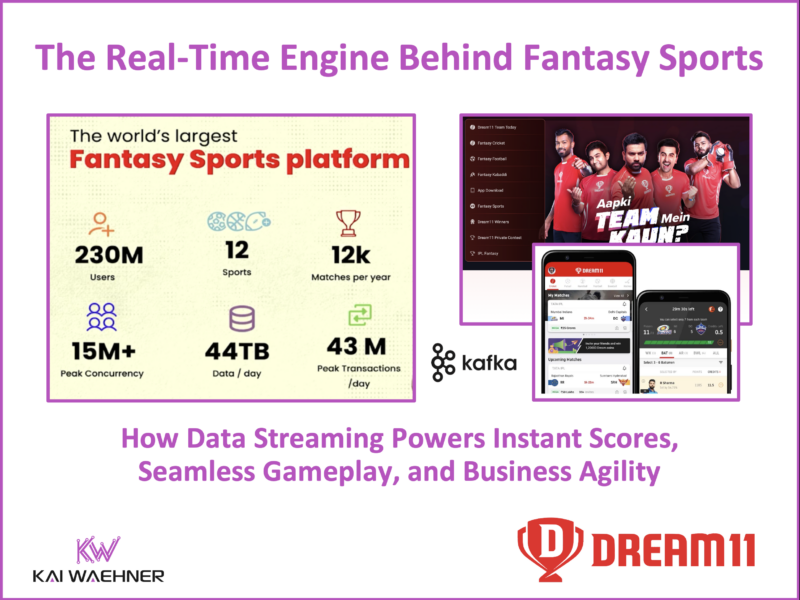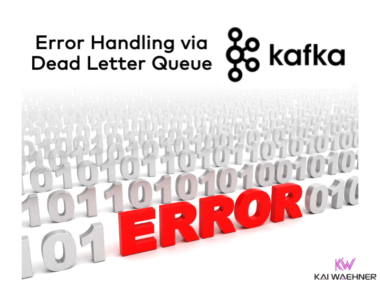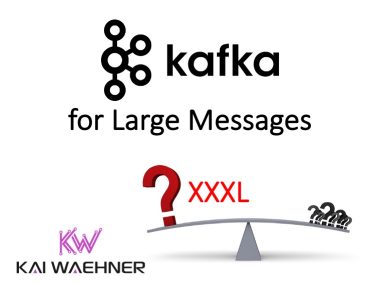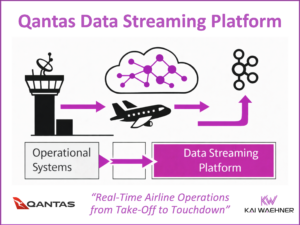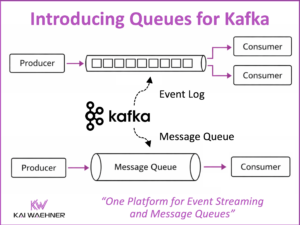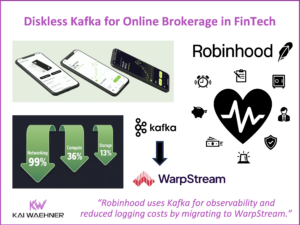Fantasy sports has become one of the most dynamic and data-intensive digital industries of the past decade. What started as a casual game for sports fans has evolved into a massive business, blending real-time analytics, mobile engagement, and personalized gaming experiences. At the center of this transformation is Apache Kafka—a critical enabler for platforms like Dream11, where millions of users expect live scores, instant feedback, and seamless gameplay. This post explores how fantasy sports works, why real-time data is non-negotiable, and how Dream11 has scaled its Kafka infrastructure to handle some of the world’s most demanding user traffic patterns.
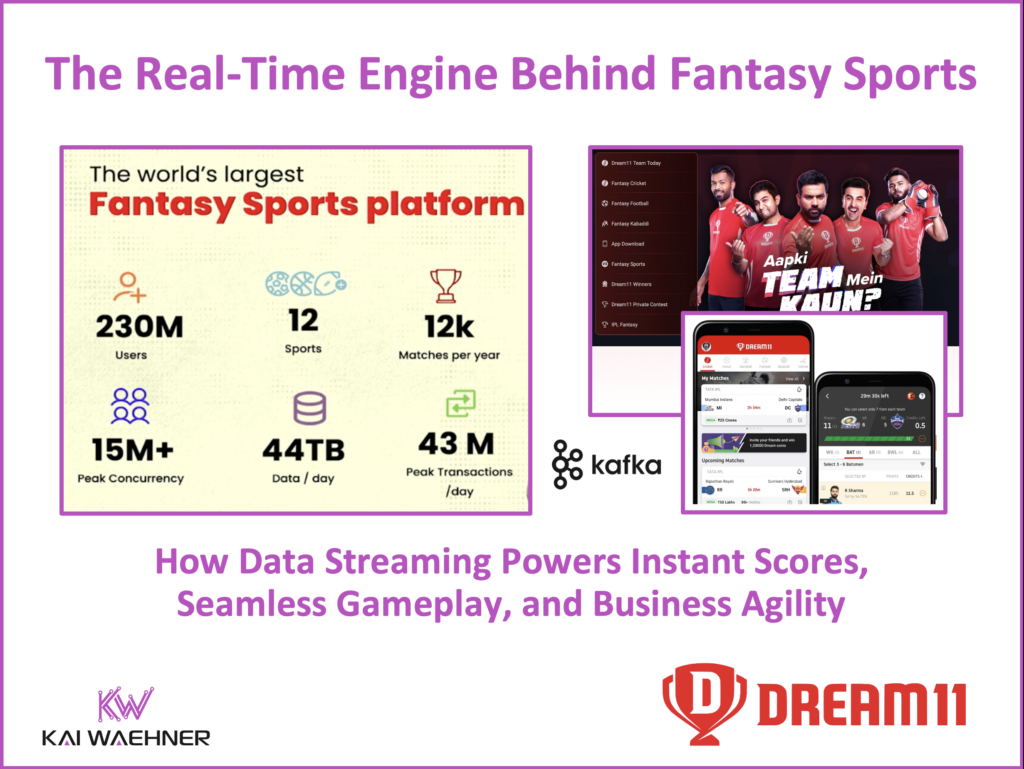
Join the data streaming community and stay informed about new blog posts by subscribing to my newsletter and follow me on LinkedIn or X (former Twitter) to stay in touch. And make sure to download my free book about data streaming use cases, including several success stories around gaming, loyalty platforms, and personalized advertising.
Fantasy Sports: Real-Time Gaming Meets Real-World Sports
Fantasy sports allows users to create virtual teams based on real-life athletes. As matches unfold, players earn points based on the performance of their selected athletes. The better the team performs, the higher the user’s score—and the bigger the prize.
Key characteristics of fantasy gaming:
- Multi-sport experience: Users can play across cricket, football, basketball, and more.
- Live interaction: Scoring is updated in real time as matches progress.
- Contests and leagues: Players join public or private contests, often with cash prizes.
- Peak traffic patterns: Most activity spikes in the minutes before a match begins.
This user behavior creates a unique business and technology challenge. Millions of users make critical decisions at the same time, just before the start of each game. The result: extreme concurrency, massive request volumes, and a hard dependency on data accuracy and low latency.
Real-time infrastructure isn’t optional in this model. It’s fundamental to user trust and business success.
Dream11: A Fantasy Sports Giant with Massive Scale
Founded in India, Dream11 is the largest fantasy sports platform in the country—and one of the biggest globally. With over 230 million users, it dominates fantasy gaming across cricket and 11 other sports. The platform sees traffic that rivals the world’s largest digital services.
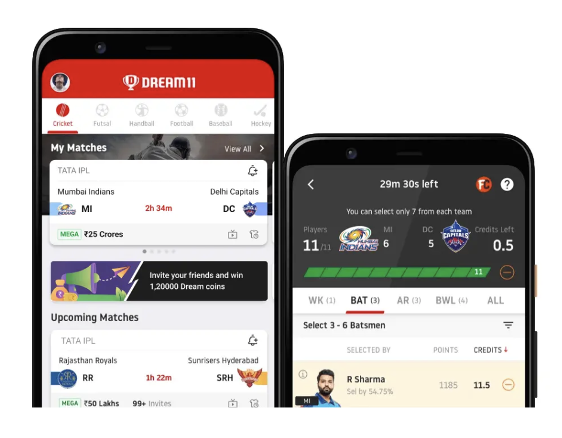
Bipul Karnanit from Dream11 presented very interesting overview at Current 2025 in Bangalore India. Here are a few statistics about Dream11’s scale:
- 230M users
- 12 sports
- 12,000 matches/year
- 44TB data per day
- 15M+ peak concurrent users
- 43M+ peak transactions/day
During major events like the IPL, Dream11 experiences hockey-stick traffic curves, where tens of millions of users log in just minutes before a match begins—making lineup changes, joining contests, and waiting for live updates.
This creates a business-critical need for:
- Low latency
- Guaranteed data consistency
- Fault tolerance
- Real-time analytics and scoring
- High developer productivity to iterate fast
Apache Kafka at the Heart of Dream11’s Platform
To meet these demands, Dream11 uses Apache Kafka as the foundation of its real-time data infrastructure. Kafka powers the messaging between services that manage user actions, match scores, payouts, leaderboards, and more.
Apache Kafka enables:
- Event-driven microservices
- Scalable ingestion and processing of user and game data
- Loose coupling between systems with data products for operational and analytical consumers
- High throughput with guaranteed ordering and durability

Solving Kafka Consumer Challenges at Scale
As the business grew, Dream11’s engineering team encountered challenges with Kafka’s standard consumer APIs, particularly around rebalancing, offset management, and processing guarantees under peak load.
To address these issues, Dream11 built a custom Java-based Kafka consumer library—a foundational component of its internal platform that simplifies Kafka integration across services and boosts developer productivity.
Dream11 Kafka Consumer Library:
- Purpose: A custom-built Java library designed to handle high-volume Kafka message consumption at Dream11 scale.
- Key Benefit: Abstracts away low-level Kafka consumer details, simplifying tasks like offset management, error handling, and multi-threading, allowing developers to focus on business logic.
- Simple Interfaces: Provides easy-to-use interfaces for processing records.
- Increased Developer Productivity: Standardized library lead to faster development and fewer errors.
This library plays a crucial role in enabling real-time updates and ensuring seamless gameplay—even under the most demanding user scenarios.
For deeper technical insights, including how Dream11 decoupled polling and processing, implemented at-least-once delivery, and improved throughput with custom worker pools, watch the Dream11 engineering session from Current India 2025 presented by Bipul Karnanit.
Fantasy Sports, Real-Time Expectations, and Business Value
Dream11’s business success is built on user trust, real-time responsiveness, and high-quality gameplay. With millions of users relying on accurate, timely updates, the platform can’t afford downtime, data loss, or delays.
Data Streaming with Apache Kafka enables Dream11 to:
- React to user interactions instantly
- Deliver consistent data across microservices and devices
- Scale dynamically during live events
- Streamline the development and deployment of new features
This is not just a backend innovation—it’s a competitive advantage in a space where milliseconds matter and trust is everything.
Dream11’s Kafka Journey: The Backbone of Fantasy Sports at Scale
Fantasy sports is one of the most demanding environments for real-time data platforms. Dream11’s approach—scaling Apache Kafka to serve hundreds of millions of events with precision—is a powerful example of aligning architecture with business needs.
As more industries adopt event-driven systems, Dream11’s journey offers a clear message: Apache Kafka is not just a messaging layer—it’s a strategic platform for building reliable, low-latency digital experiences at scale.
Whether you’re in gaming, finance, telecom, or logistics, there’s much to learn from the way fantasy sports leaders like Dream11 harness data streaming to deliver world-class services.
Join the data streaming community and stay informed about new blog posts by subscribing to my newsletter and follow me on LinkedIn or X (former Twitter) to stay in touch. And make sure to download my free book about data streaming use cases, including several success stories around gaming, loyalty platforms, and personalized advertising.

